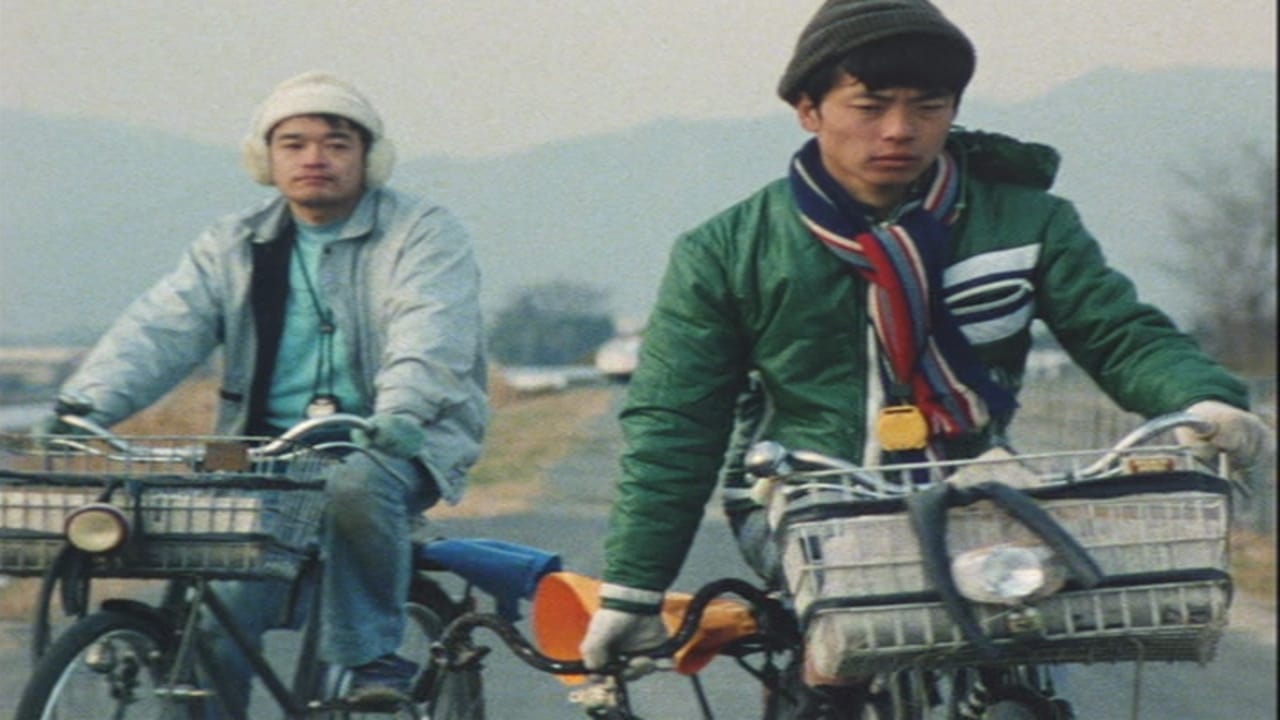

This is an early Sono Shion effort, both directed and acted by him, that has not received enough attention despite the cult status the director has achieved. Yet a lot of Sono's trademarks are already present in 'Jidensha Toiki', from the disregard for conventional modes of storytelling to the gripping imagery and maladapted cast.This is something of a coming of age movie but told in a strange way as is to be expected from Sono. While not quite a character study it is the characters that propel the movie forward. Sono plays Shiro, one of the leads, a young man who is somewhat stranded having failed to enter college and who regresses into the pat by obsessing about a movie he started with his high school friends; one of this is the other lead, Keita, who is also in a limbo of sorts regarding his future. Then there is Shiro's younger sister Katako who suffered from polio but recovered due to a running routine that she retains and Keita's ex-girlfriend who is studying in Tokyo.The plot is simple enough, youths adrift in a small town in Japan cling to movie making as they go through emotional breakdown but the way it all transpires on screen is hardly conventional. There seems to be a self referential element to 'Jidensha Toiki', not only is the main played by Sono himself as he is driven to pursue movie making to the exclusion of all else.This movie-within-a-movie is interesting in itself. It features a baseball game with invisible players, the first of all is a tall figure wearing a Godzilla mask, then it spirals into a conspiracy with plenty of cheesy B-movie techniques of shooting. Meanwhile this mysterious masked person takes off with a line marker and goes on a journey that later comes to play into the narrative proper.A lot of this movie-within-a-movie is shot in a ruined playground that morphs into the headquarters of the bad guys once the conspiracy subplot kicks in. It results in one of the most impressive images as it becomes all lit up. But in the reality of the movie in which Shiro, Keita and the others exist this playground is a hangout place that makes sense: they all fail to progress into the future, in Shiro's words 'time stopped for me when high school ended', so it figures they should haunt ruined hallmarks of childhood.'Jidensha Toiki' seems to veer into Lynchian territory on occasion: Keita's father who is pushing for him to succeed him as the head of the family hospital and as such study medicine, only appears wearing an animal suit and masks abound in unlikely situations. Perhaps to display how alienated the characters are.As the title implies (Bicycle Sighs) there is plenty of riding of bicycles of also having a funeral for one and burning another. Following lines starts out as a quirk in the movie they are shooting to then gain a symbolic depth as the movie moves toward its ambiguous climax.What makes the movie difficult to follow is not so much the medium, there is a lot of hand-held camera before such a method became popular, as the characters' reactions. Everyone seems gradients of insanity with bursts of self-affirmation that seem doomed to fail. These means of making a stand are very Japanese: Katako write 'watashi' (a formal unisex pronoun for 'I') on a flag, climbs on the house's roof and shouts her name that she explains in its meaning ('Kata' meaning 'route' and 'Ko' meaning 'child') and Shiro writes 'ore' (informal male pronoun for 'I') on a flag and runs around town waving it after having a fallout with Keita.Not a lot is explaining but the viewer can feel a shared history between these characters and how much at a loss they are. The movie moves from non-conventional to almost surreal as it progresses but it remains solid throughout. Instead of the usual flashbacks we have the movies they make: Keita's movie about his girlfriend is a short silent piece that tells more than a lot of dialogue would have done.The acting is good even if at times veers into overreacting. Overall, 'Jidensha Toiki' is a small movie with a lot to say that may not always come across all that well. It is an indie production that knows how to use its potential limitations to its advantage. While apparently disjointed there is a lot of deliberate structure underneath it all and recurring themes that tie it all together.Fans of Sono's well known works should give this a go if only for the sake of curiosity. Those not familiar with Sono should probably not choose 'Jidensha Toiki' as their introduction to such a forceful and original director.
... View More